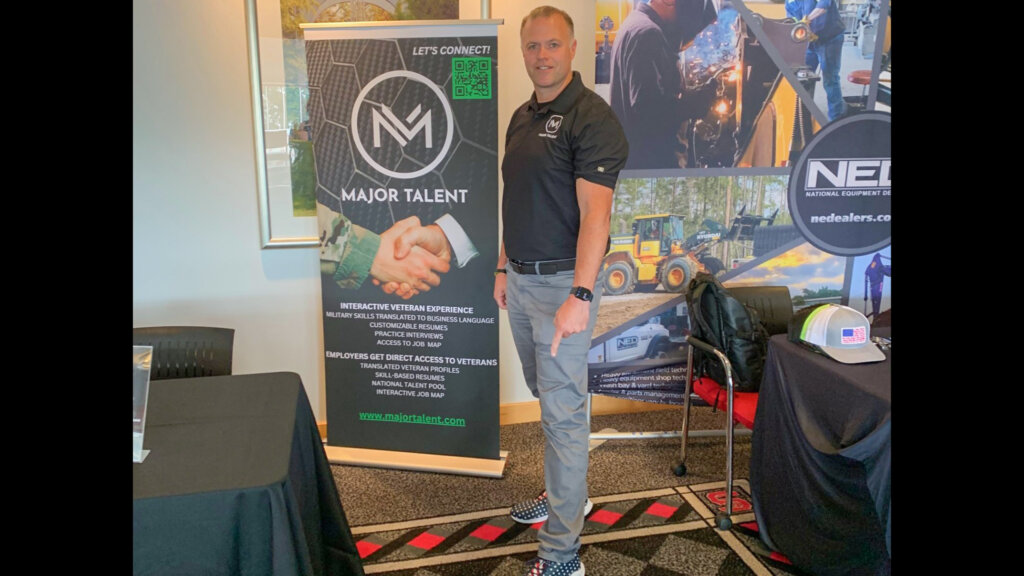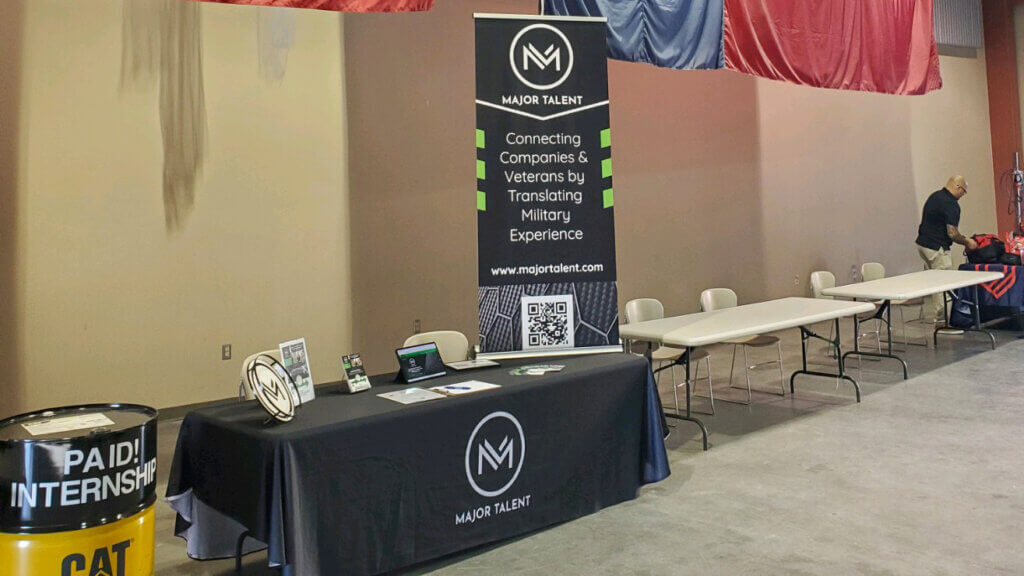
Having retired from his military career, Tim den Hoed is spending his second career helping fellow veterans navigate the post-military transition to civilian life. Through his Omaha-based business, Major Talent, Tim unites veterans with employers looking for high-character, highly skilled individuals.
Originally from Iowa, den Hoed joined the Infantry Marine Corps when he graduated from high school. He spent four years traveling the world with the Marine Corps, but in 2000 decided to take a break to pursue a college degree.
The September 11th tragedy inspired him to return to the military. He joined the Air Force in 2002, where he worked as a fire truck mechanic before moving into a military recruiter role in Sioux Falls, South Dakota. In 2006, he was named one of the top five military recruiters in the nation. He held several other positions during his military service, being stationed in South Carolina, Texas, Hawaii, South Dakota, Kansas, Qatar, and eventually Nebraska.
Nebraska opportunity
In 2018, den Hoed retired from his military career. He decided Omaha was a good landing spot to pursue his next chapter. He had spent the last six years of his military career based in Omaha and knew the city well.
“There’s a lot of opportunity in Omaha, and people are still very willing to open a door—they’re willing to help. Living in Omaha, you can see that the people are nice,” explained den Hoed.
Nebraska was also appealing because of its support for the veteran community. “There are a lot of companies that love our veterans. They love the veteran community. And that corporate responsibility of taking care of our vets is common in Nebraska. Not just in Omaha, but throughout the entire state,” said den Hoed.

Nebraska community support
Den Hoed used many of the resources available in Nebraska to help entrepreneurs build a business. He established Major Talent thanks to the support of the Nebraska Startup Academy, 1 Million Cups, the Veterans Business Outreach Center, and the Nebraska Department of Economic Development (DED).
“The DED has been super instrumental for me,” said den Hoed. “They offered me a prototype grant to build the platform [for my business]. I got the initial award, and I got a follow-up award this year. There’s an indebtedness. I owe Nebraska because of what they were able to help me with. I wouldn’t be here if it wasn’t for them.”
The missing link
Den Hoed started Major Talent on the side in 2022 while working full-time in business development. For veterans retiring from the military, transitioning to the civilian workforce can be challenging. One difficulty is that many terms used in the military are dissimilar from those used in civilian industries.
Each industry has its own way of describing certain positions and skills, and the military is no different. A veteran applying for a job may be fully qualified for the position. Yet because they do not use the expected terminology on their application or résumé, the business won’t interview them.
“We speak an entirely different language. Our positions are different, our ranks are different, our titles are different. And in everything we do, our job codes are different,” explained den Hoed. “A mechanic in the Air Force has different coding than a mechanic outside the military.”
To bridge this gap, den Hoed created a software that translates military terms into language used in different industries. “We’re building an experience for our veterans as they separate from the service that makes the transition from the service to the civilian sector much easier,” said den Hoed.
Major Talent offers this service as a free resource to veterans and military spouses. Job seekers can build a profile, enter their skills and experiences, and have key terms translated into language familiar with employers. The veterans are also offered free resume building and interview experience through the platform. “Our software automatically translates everything into a skills-based terminology that employers understand,” said den Hoed. This helps employers more clearly understand the valuable skills veterans have to offer.
Businesses are then able to access this information and find employees whose skills match their needs. Employers who partner with Major Talent can post jobs to a job map where veterans directly apply to the jobs. The businesses can even interview the potential employee through the Major Talent software. “The affirmation we get on both sides is awesome,” said den Hoed. “They are like, ‘That’s the missing link!’”
Bringing veterans to Nebraska
CQuence Health in Omaha recently worked with Major Talent to fill a field services engineer position in Scottsbluff. This is a difficult role to fill because of the specific technical skills needed. The field services engineer must be trained in both mechanical and electrical troubleshooting. Den Hoed searched through the Major Talent platform to find somebody who would fit this position and discovered an aircraft mechanic in Rapid City, South Dakota.
Den Hoed contacted the veteran and told him about the job. The aircraft mechanic had interest and said he never would have thought to look for this job without the support of Major Talent. Den Hoed helped present his résumé to CQuence Health, highlighting his specific skills rather than military job titles. “You assume so much based on a title, which is often inaccurate,” said den Hoed.
This led to the veteran being hired and moving his family to Nebraska. “We brought him from outside Nebraska into Nebraska to take a hard-to-fill position that’s critical. And his skills align perfectly,” said den Hoed.
Nationally, veterans own 5.5% of businesses. In Nebraska, the share of veteran-owned businesses is higher—at 7.1%. To learn more about entrepreneurial services for veterans in Nebraska, visit the Veterans Business Outreach Center at nebbiz.org/vboc.


